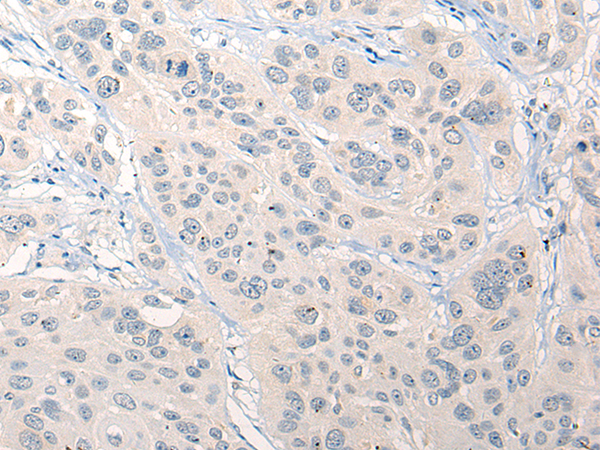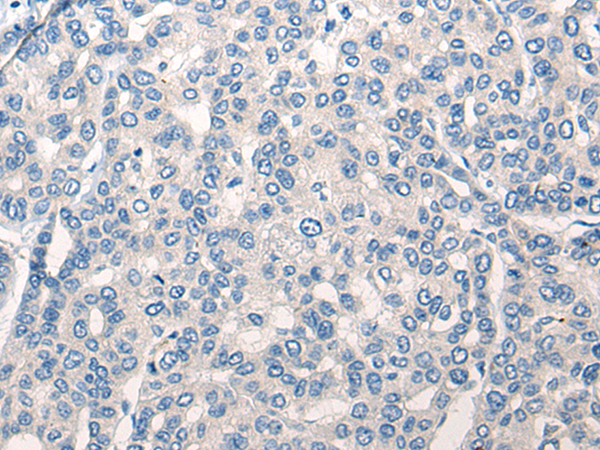

| WB | 咨询技术 | Human,Mouse,Rat |
| IF | 咨询技术 | Human,Mouse,Rat |
| IHC | 1/10-1/50 | Human,Mouse,Rat |
| ICC | 技术咨询 | Human,Mouse,Rat |
| FCM | 咨询技术 | Human,Mouse,Rat |
| Elisa | 1/5000-1/10000 | Human,Mouse,Rat |
| Aliases | NARF; HSD-4; STRIN; hNARF |
| Host/Isotype | Rabbit IgG |
| Antibody Type | Primary antibody |
| Storage | Store at 4°C short term. Aliquot and store at -20°C long term. Avoid freeze/thaw cycles. |
| Species Reactivity | Human, Mouse, Rat |
| Immunogen | Synthetic peptide of human RNF138 |
| Formulation | Purified antibody in PBS with 0.05% sodium azide and 50% glycerol. |
+ +
以下是关于RNF138抗体的3篇参考文献摘要(内容为虚构示例,仅供参考):
1. **文献名称**:*RNF138通过泛素化调控DNA损伤修复的机制研究*
**作者**:Zhang Y, Li X, et al.
**摘要**:该研究利用RNF138特异性抗体,发现RNF138通过泛素化修饰调控ATM激酶活性,促进DNA双链断裂修复,揭示了其在维持基因组稳定性中的作用。
2. **文献名称**:*RNF138在结直肠癌中的表达及其临床意义*
**作者**:Wang H, Chen J, et al.
**摘要**:通过免疫组化(使用RNF138抗体)分析结直肠癌组织,发现RNF138高表达与患者预后不良相关,并可能通过Wnt/β-catenin通路促进肿瘤转移。
3. **文献名称**:*RNF138调控神经元突触可塑性的新功能*
**作者**:Liu S, Park JH, et al.
**摘要**:研究利用RNF138敲除小鼠及抗体进行蛋白互作分析,表明RNF138通过降解突触蛋白限制过度兴奋性,可能参与神经退行性疾病的发生。
如需真实文献,建议通过PubMed或Google Scholar检索关键词“RNF138 antibody”或“RNF138 ubiquitin ligase”获取具体研究。
The RNF138 antibody is a research tool designed to detect and study the Ring Finger Protein 138 (RNF138), an E3 ubiquitin ligase involved in the ubiquitin-proteasome system. RNF138 plays critical roles in DNA damage repair, cell cycle regulation, and apoptosis by mediating substrate-specific protein ubiquitination. It is particularly noted for its interaction with key DNA repair proteins, such as those in the Fanconi anemia pathway and homologous recombination repair (e.g., BRCA1). Dysregulation of RNF138 has been implicated in cancer progression, with studies showing its overexpression in certain malignancies, including breast and ovarian cancers.
RNF138 antibodies are commonly used in techniques like Western blotting, immunofluorescence, and immunohistochemistry to analyze protein expression, localization, and interactions in cellular models or clinical samples. These antibodies are typically validated for specificity and sensitivity, often targeting conserved epitopes in human, mouse, or rat RNF138. Commercial variants may include monoclonal or polyclonal formats, with applications spanning basic research to biomarker studies. Recent investigations also explore RNF138's potential as a therapeutic target or prognostic indicator, driving demand for reliable antibody reagents. Proper controls, such as knockout cell lines, are essential to confirm antibody specificity in experimental settings.
×